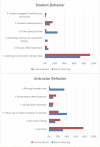Instructor facilitation mediates students' negative perceptions of active learning instruction
- PMID: 34941920
- PMCID: PMC8699631
- DOI: 10.1371/journal.pone.0261706
Instructor facilitation mediates students' negative perceptions of active learning instruction
Abstract
Studies have demonstrated students' resistance to active learning, despite evidence illustrating that their learning is improved relative to students in lectures. Specifically, while active learning and group work are effective at engaging students in their learning process, studies report that students' perceptions of active learning approaches are not always positive. What remains underexplored is whether students' perceptions of active learning improve with effective instructor facilitation and whether there exists differential perceptions between racially minoritized students and represented students. Here, we estimate students' perceptions of effective instructor facilitation as the mediator in the relationship between active learning and perceptions of learning and perceived utility for class activities (task value). Then, we examine differences by racial identification. We collected classroom observation data to empirically categorize courses as active learning or lecture-based and surveyed 4,257 college students across 25 STEM classrooms at a research-intensive university. We first examined the relationship between active learning on student perceptions and found a negative relationship between active learning and perceptions of learning and task value for both racially minoritized students and represented students. Next, we assessed whether students' perceptions of instructor effectiveness in facilitating group activities mediate these negative relationships. We found that, on average, students of all races were more likely to positively perceive instructor facilitation in active learning classes relative to lectures. In turn, the positive perceptions of instructor facilitation partially suppressed the negative relationship between active learning and perceptions of learning and task value. These results demonstrate that effective instructor facilitation can influence both students' self-assessment of learning and perceived utility of the learning activities, and underscores the importance of developing pedagogical competence among college instructors.
Conflict of interest statement
The authors have declared that no competing interests exist.
Figures
References
-
- Prince M. Does active learning work? A review of the research. Journal of Engineering Education. 2004;93: 223–231. 10.1002/j.2168-9830.2004.tb00809.x - DOI
-
- Bonwell CC, Eison JA. Active learning: creating excitement in the classroom. Washington, DC: School of Education and Human Development, George Washington University; 1991.
-
- Burke A. Group work: How to use groups effectively. The Journal of Effective Teaching. 2011;11: 87–95.



